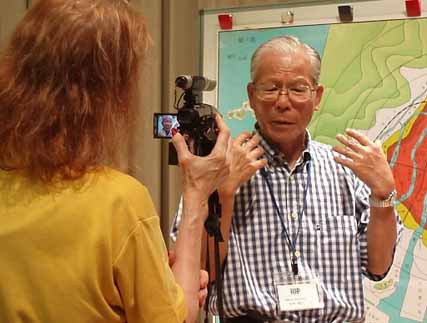A-bomb survivor Shozo Hirai shares his experience of the bombing in English
Jul. 16, 2008
by Masayoshi Ishikawa, Staff Writer
Shozo Hirai, 78, a resident of Fuchu Town in Hiroshima, began learning English in his 70s and this summer marks his fourth year serving as a volunteer sharing his experience of the atomic bombing in English. Supported by the members of a citizens group whose mission is providing interpretation services related to peace and A-bomb issues, Mr. Hirai is committed to conveying his experience to the world.
Mr. Hirai was exposed to the bombing at his classmate’s house in Asaminami Ward when he was a fourth-year student at Prefectural Hiroshima Commercial School (now, Hiroshima Commercial High School). He lost his father, who went to work in the city center, and his younger brother, who was mobilized for building demolition work, to the bomb.
After the war, Mr. Hirai went to work for a department store in the city. Around 2002, shortly after he retired, he started to attend an English conversation class held in his neighborhood “just to kill time.” But there, a Canadian instructor encouraged him to speak about his A-bomb experience in English.
He then shared his experience in English for the first time on August 6, 2005 by approaching foreign visitors in Peace Memorial Park. Looking back on that moment, he remarked, “My English was poor, but as I continued, more and more people gathered to hear my story.”
In 2006, Mr. Hirai took a short English course at a language school in the state of South Carolina in the United States. Upon his return to Japan, he joined a citizens group called “Hiroshima Interpreters for Peace (HIP)” and since then he has been sharing his experience with foreign tourists who visit Peace Memorial Museum and Peace Memorial Park.
Using gesture to help communicate his story, Mr. Hirai describes walking around the scorched earth with his mother after the bombing and searching for his father’s remains. Keiko Ogura, 70, the head of HIP, commented that Mr. Hirai’s “passion for conveying his experience to the younger generation is amazing.”
Mr. Hirai’s testimony was used in a study guide for HIP members to improve their interpreting skills. He never misses practice sessions arranged by HIP and says, “As long as I live, I would like to help hand down memories of the atomic bombing as best I can.” It appears Mr. Hirai will have another busy summer sharing his story. On August 6, he will deliver his testimony at Peace Memorial Museum.
(Originally published on July 10, 2008)
Shozo Hirai, 78, a resident of Fuchu Town in Hiroshima, began learning English in his 70s and this summer marks his fourth year serving as a volunteer sharing his experience of the atomic bombing in English. Supported by the members of a citizens group whose mission is providing interpretation services related to peace and A-bomb issues, Mr. Hirai is committed to conveying his experience to the world.
Mr. Hirai was exposed to the bombing at his classmate’s house in Asaminami Ward when he was a fourth-year student at Prefectural Hiroshima Commercial School (now, Hiroshima Commercial High School). He lost his father, who went to work in the city center, and his younger brother, who was mobilized for building demolition work, to the bomb.
After the war, Mr. Hirai went to work for a department store in the city. Around 2002, shortly after he retired, he started to attend an English conversation class held in his neighborhood “just to kill time.” But there, a Canadian instructor encouraged him to speak about his A-bomb experience in English.
He then shared his experience in English for the first time on August 6, 2005 by approaching foreign visitors in Peace Memorial Park. Looking back on that moment, he remarked, “My English was poor, but as I continued, more and more people gathered to hear my story.”
In 2006, Mr. Hirai took a short English course at a language school in the state of South Carolina in the United States. Upon his return to Japan, he joined a citizens group called “Hiroshima Interpreters for Peace (HIP)” and since then he has been sharing his experience with foreign tourists who visit Peace Memorial Museum and Peace Memorial Park.
Using gesture to help communicate his story, Mr. Hirai describes walking around the scorched earth with his mother after the bombing and searching for his father’s remains. Keiko Ogura, 70, the head of HIP, commented that Mr. Hirai’s “passion for conveying his experience to the younger generation is amazing.”
Mr. Hirai’s testimony was used in a study guide for HIP members to improve their interpreting skills. He never misses practice sessions arranged by HIP and says, “As long as I live, I would like to help hand down memories of the atomic bombing as best I can.” It appears Mr. Hirai will have another busy summer sharing his story. On August 6, he will deliver his testimony at Peace Memorial Museum.
(Originally published on July 10, 2008)








